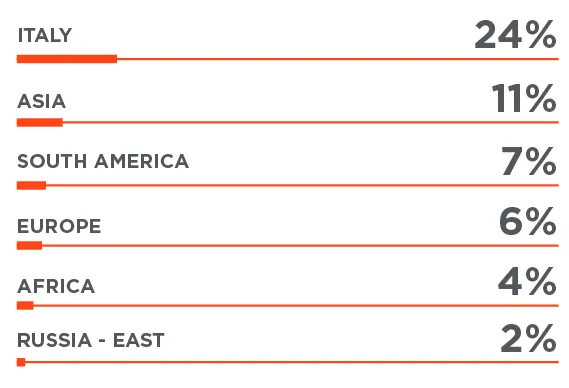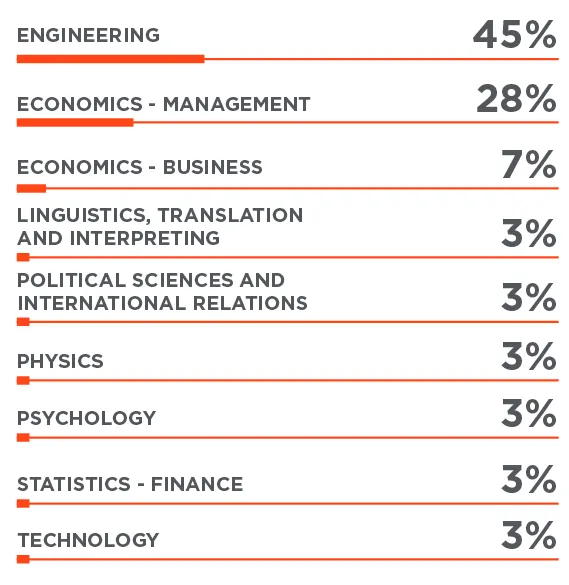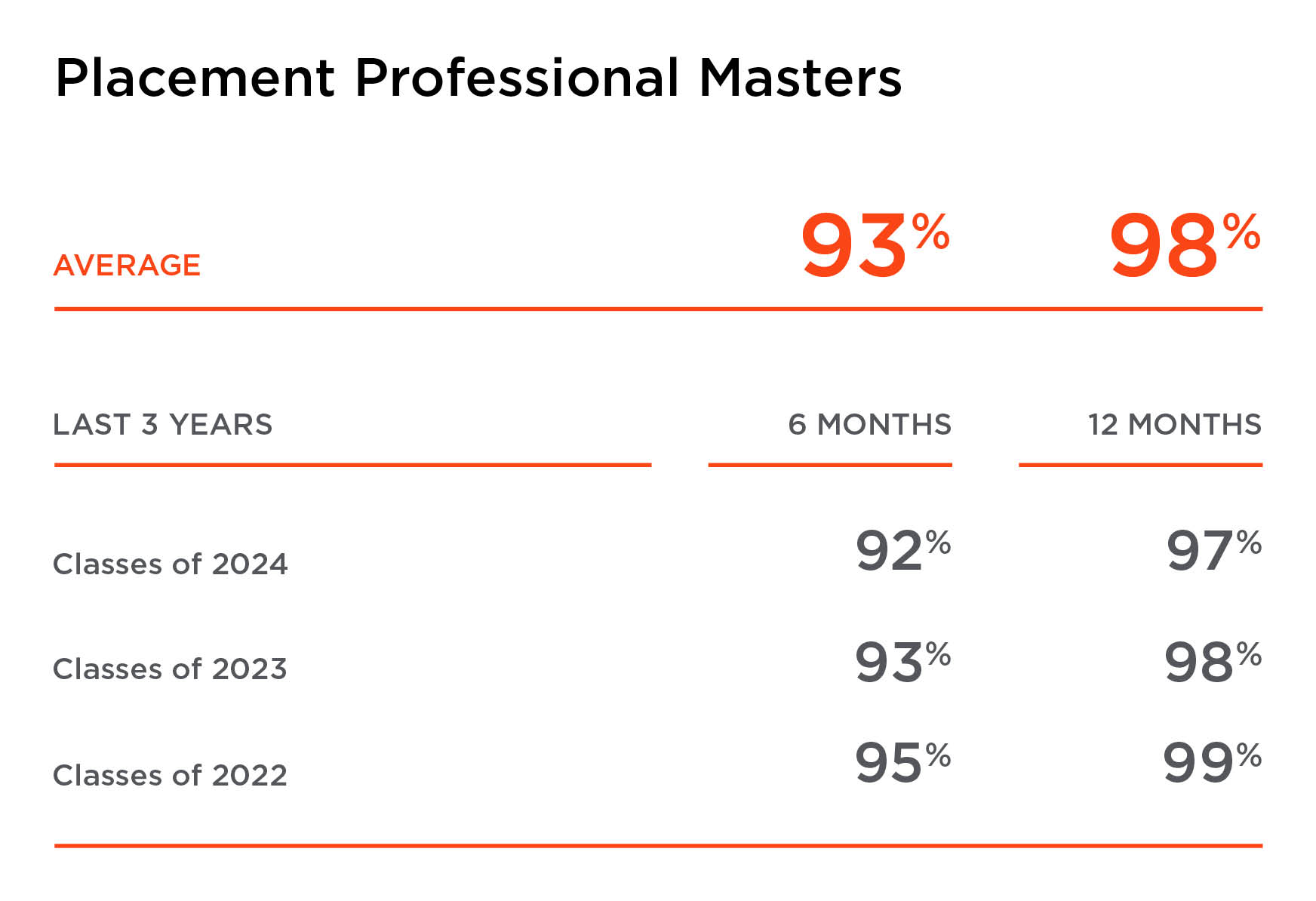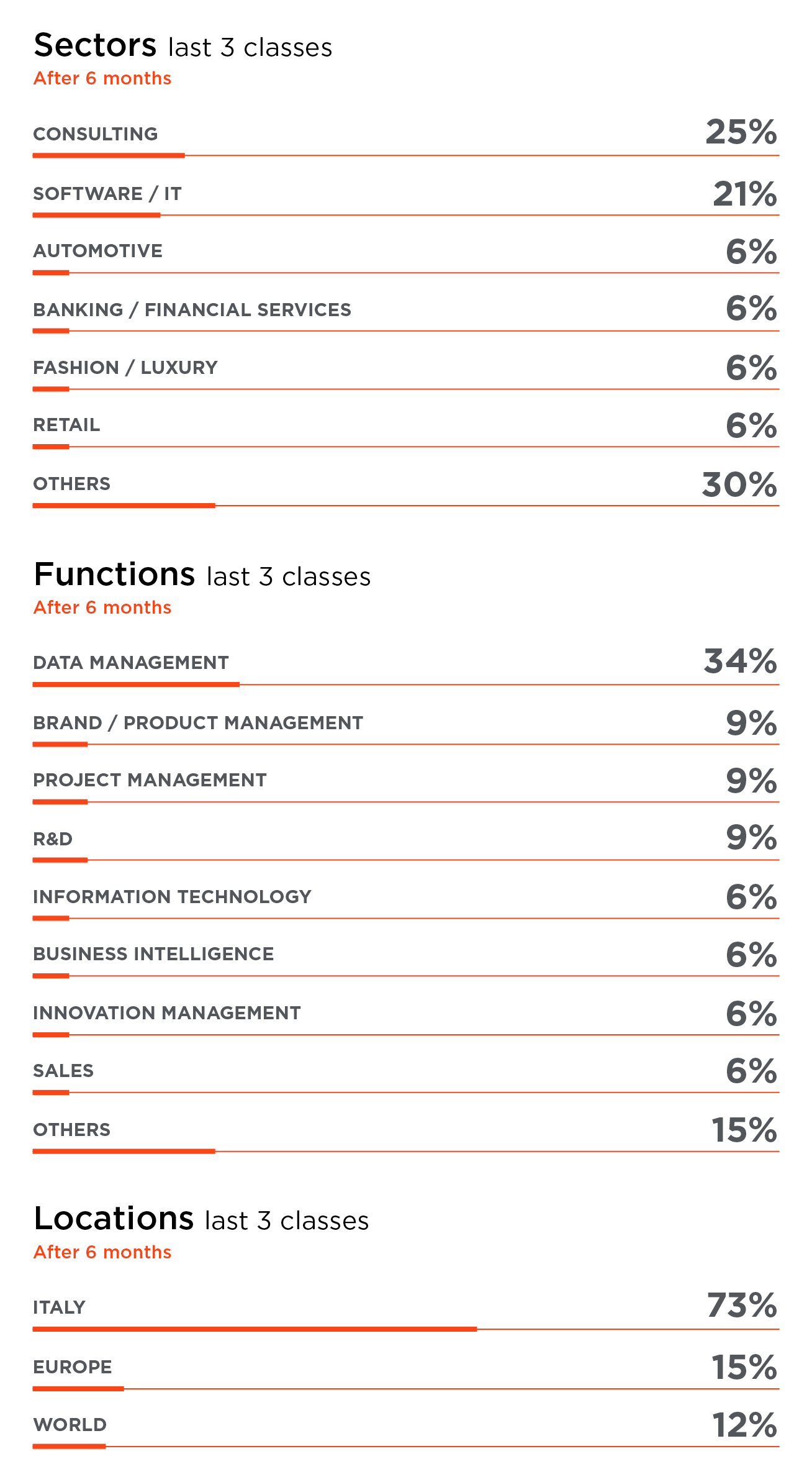
THE PROFESSIONAL MASTER IN ARTIFICIAL INTELLIGENCE AND INNOVATION MANAGEMENT AT BBS GIVES YOU THE OPPORTUNITY TO:
• experience a unique vibrant international environment
• connect with leading Italian companies
• do meaningful work that makes an impact
• gain cutting-edge skills at the forefront of AI
• accelerate your career in the AI field through a market-oriented learning path
GOALS
The Master in Artificial Intelligence and Innovation Management is designed for those who want to start a managerial career or develop their own entrepreneurial idea by fully leveraging the tools of artificial intelligence.
In 12 months full-time, taught in English and including an internship period in a company, the program combines technical AI courses with management modules, thus providing the multidisciplinary skills needed to communicate with technical departments, lead complex projects using AI in all its forms, and make a tangible contribution to innovation and digital transformation.
Attending the Master in Artificial Intelligence and Innovation Management means entering a unique context: Bologna is home to the Leonardo supercomputer and CINECA – Italy’s leading supercomputing center – and is one of the country’s main hubs for artificial intelligence development. It means working in an international environment, tackling real-world challenges and concrete business cases. Finally, it means having excellent job prospects: data from previous editions show a placement rate above 90% within six months after graduation.
WHO IS IT FOR?
The Master is intended for young graduates with excellent English skills, interested in building a professional career in management or entrepreneurship, grounded in a direct understanding of the main AI tools currently used in business.
The program welcomes students from diverse academic backgrounds. A technical background is not required, but openness to interdisciplinary learning, curiosity, initiative, and a desire to explore AI’s transformative potential are essential.
CAREER OPPORTUNITIES
Regardless of your academic background—whether you want to reinvent yourself or build a professional profile in artificial intelligence from scratch—the Master in Artificial Intelligence and Innovation Management is your starting point.
The program provides direct access to the world of technology applied to business. AI Manager, Business Analyst, Project Manager with AI, and LLM Integration Consultant are just some of the most in-demand roles in today’s job market, and this Master offers a concrete pathway to them.
The world of emerging technologies is looking for young professionals ready to make a difference. Thanks to the constant support of the Career Service and the professional network of BBS, the Master in Artificial Intelligence and Innovation Management is not just a Master’s program—it’s a career accelerator in the AI field.
SERVICES
Bologna Business School provides student support services included in the tuition fee for the Master.
Programme Advisory Committee:
- Alessandra Benedetti – Head of Digital Transformation, SCM Group
- Marianna Bonanome – Head of AI Strategy and Partnerships, Sand Box
- Marco Ferrando – Head of BU Data Science, Var Group
- Stefano Spaggiari – Co-Founder, ExpertAI
- Giovanni Strocchi – Co-founder & Venture Partner, Blacksheep
- Francesco Ubertini – President, CINECA
- Marcella Zucca – I&D Head of Generative AI and Sustainability Italy, Capgemini
Accreditation

Bologna Business School is EQUIS – EFMD Quality Improvement System accredited, one of the most important international quality assessment and continuous improvement systems for Schools of Management and Business Administration.

Maurizio Gabbrielli
Director of Studies
maurizio.gabbrielli@unibo.it
" The Master's program is built on an integrated approach, combining the development of cross-functional skills, a constant focus on innovation, openness to an international network, and a learning structure optimized for fast and effective knowledge acquisition.
The program has proven its ability to successfully support the professional transition of individuals from diverse backgrounds — from philosophers turned cybersecurity experts to economists transformed into digital innovation leaders.
The Master in Artificial Intelligence and Innovation Management offers a concrete opportunity for growth to those who wish to redefine their role in today’s technological landscape. A training experience designed to lead change! "

Letizia Bizzotto
" The Master’s program allowed me to develop both technical skills and soft skills that I now use every day in my job. The numerous group projects taught me how to communicate effectively, work collaboratively, and handle complex situations—just like those encountered in the workplace. My advice to anyone starting this journey is to fully engage: every project and every exam is a chance to understand how to apply theory to practice. Curiosity and the willingness to explore new areas truly make the difference. Today I'm AI Engineer at Dallara. "
CLASS PROFILE A. Y. 2024/2025
GEOGRAPHICAL ORIGIN

ACADEMIC BACKGROUND

-
28 y.o.
AVERAGE AGE
-
52%
INTERNATIONAL STUDENTS
-
13
COUNTRIES REPRESENTED
-
28%
FEMALE STUDENTS
Structure
The Master in Artificial Intelligence and Innovation Management is a full-time program structured in 1.500 hours of learning activities over 12 months of study, divided into: 400 hours of lecturing, an estimated 600 hours of independent study, and 500 hours of internship.
The structure of the Master is divided into:
- First term: October 2025 – March 2026
- Second term: March 2025 – June 2026
- Internship: June 2025 – October 2026
The Master offers a series of pre-courses at the start of the academic schedule: Software programming (Python), data-base and SQL, statistics, finance and accounting.
Following the period of lessons and projects, students will start an internship that can be carried out at companies or agencies in Italy or abroad. This experience allows students to practically apply the theoretical and practical skills acquired during their studies, learning directly from industry pleadres. At the end of the internship, the student will present a “Final Report” to the Director of Studies, containing a description of the activities performed and an analysis of the knowledge gained during the classes period.
For international students, the School offers the opportunity to participate in an Italian language course during the classroom study period.
The Master is held on campus at Bologna Business School. Attendance involves approximately 30 hours of weekly classes, structured to allow time for group work while also ensuring attention to individual students and the management of interpersonal relationships.
COURSES
Big Data is a big challenge in today’s world. Companies and public entities urgently need to manage the acquisition, presentation, sharing, analysis and visualization of data.
The first module starts with a general overview of the Data Revolution and Industry 4.0 and then jumps into the world of technologies and architectures provided by the main cloud and technology vendors. In the second part, the course explores how to use structured and unstructured data at their best, so to jump in the “AI world” to get insights to provide support to business decisions, with some case studies.
Baffetti FedericoThe course discusses some relevant themes related to blockchain technologies, cryptocurrencies, ICOs, smart contracts and novel applications that can be built over the blockchain. Bitcoin and novel cryptocurrencies gathered momentum in the last months. More and more investors look with interest at these technologies, while others label them as a dangerous speculative bubble. The truth is that the blockchain, and the alternative implementations of a distributed ledger, represent very innovative technologies, that can be exploited to build novel distributed applications. Moreover, the possibility of creating smart contracts, running on top of the blockchain, permits trusted interactions and agreements among different (and possibly anonymous) parties, without the need for a central authority. This course will illustrate the main principles and conceptual foundations of the blockchain and smart contracts.
Ferretti StefanoThe course focuses on data protection law. After a brief overview of the Italian and European framework, the course will focus on the new General Data Protection Regulation, applicable all around Europe since May 2018. The course aims at exploring the relevant obligations of controllers and processors. Specific attention will also be paid to conditions of lawfulness of the processing, data subjects’ rights and controller’s accountability.
Miandar Toloue
Computer vision pursues understanding the content of digital images through a large corpus of techniques drawing from a variety of diverse fields. These include, among the others, signal and information theory, calculus, geometry and linear algebra, probability and statistics, optimization, machine learning.
Computer vision has emerged through the last three decades as a key process technology to realize inspection and assembly of manufactured goods. Moreover, thanks to recent breakthroughs in image sensing and analysis, we now witness ever-increasing deployment of computer vision within products as widespread as cars, gaming consoles, apps, personal computers, home appliances.
The course will present an overview of some of the most effective computer vision techniques alongside with examples dealing with both “in process” and “in product” applications.
Di Stefano LuigiToday it is crucial to be able to use data for making better marketing decisions. This is possible by better understanding, predicting and managing customers’ behavior in a landscape where customers and brands (firms) are decision makers. This course focuses on the applied use of various techniques/methods, theories and approaches from marketing literature in practical business cases. In more particular words this means exploring, investigating and predicting behavioral and attitudinal (customer) data to provide data-driven answers to relevant marketing questions
Konus UmutArtificial intelligence (AI) is a discipline whose goal is to realize this dream through the use of a wide variety of techniques, from logic-based symbolic computation to sub-symbolic models inspired by the structure of the brain, such as neural networks. This course will provide an introductory overview of the various existing artificial intelligence techniques, focusing on industrial applications, discussing future challenges and opportunities, and also addressing some of the social, economic, and ethical implications.
Amadini RobertoGabbrielli Maurizio
The aim is to provide basic knowledge concerning the main concepts and principles of computer security (e.g., risk, tools for risk assessment and evaluation, attacks and their typical structure, resources, functional systems requirements, human component). In this way, the course will provide the basic tools for the design and implementation of reasonably secure systems. During this process, either methodological, technological and behavioral aspects (i.e. operation security) need to be considered.
D’Angelo GabrieleThis course is a natural continuation of the Machine Learning course. It provides guidelines for running a Data Mining process and then discusses, with practical examples, the complete pipeline from data to machine learning concepts.
In particular, the following topics are covered:
- The functions of Data Mining.
- Supervised and unsupervised learning.
- Algorithms and methods for constructing classification models.
- Clustering algorithms.
- Algorithms for discovering association rules.
- Methods for evaluating the quality of data mining results.
Principles are introduced in class with presentation of slides and stimulating discussions with students. Methods are then applied with laboratory exercises.
Francia Matteo
Gallinucci Enrico
Sartori Claudio
The course will give some insights of Decision Support Systems from two orthogonal perspectives: an optimization-based approach, based on symbolic AI (1st part) and a data-driven approach, based on sub-symbolic AI (2nd part).
Upon completing the entire learning process, students should be able to:
• get an overall idea of what DSS are, and how to handle them from different perspectives
• identify decision problems addressable with a data-driven approach
• know the basics of modeling with constraints and MiniZinc
The digitization of the economy is one of the most relevant issues of our time. The objective of this course is to analyze how digital economy has fundamentally challenged traditional business models and created new business opportunities. We will start with a brief introduction of the digital economy and then analyze the specific business strategies adopted by the different players in this ecosystem, specifically platforms. We will also discuss the implications for public policy and regulation. In particular, we will consider whether new business practices and contracts in the digital economy are beneficial or detrimental to society. Real case studies related to Amazon, Airbnb, Booking.com, Facebook, Google, Uber, and others, will be analyzed.
MantovaniThe course is focused on understanding of the opportunities arisen from digital transformation, in terms of innovative business models for companies and new value for users. Specifically, the course will deepen technology forecasting and technology roadmapping methodologies, applied to emerging digital trends, focusing on Fintech, IoT and Artificial Intelligence.
The course focuses on the finance aspects following the life cycle of young and innovative ventures from their start-up. These young ventures usually require substantial outside financing in early stages to eventually create employment, growth, social contributions and tax revenues in their future. Bank financing is hardly available for these ventures and therefore, all funds need to be raised from other sources, e.g. friends and family, business angels, or from professional financial intermediaries, so-called venture capital and private equity funds. Besides those traditional channels, ventures can raise funds from “the crowd” using digital platforms (crowdfunding) or blockchain-based technologies (ICOs).
Groh AlexanderThe activity is aimed at proposing innovative business processes focused on digital technologies and new business models.
The course provides the application of the skills students improved during the classes by developing a practical project based on a real company case.
Companies involvement will be one of the pillars of this course. Companies will assign the project guidelines to the students, building them around the class profile, and will supervise the development of their projects, giving help if needed.
Boscato CristianoThe course analyzes the legal framework of the rights of the person when dealing with technology, the protection of personal data, the intersection between person and market in the face of technological platforms and big data, the normative references of GDPR, Digital Service Act and other legal formats with a global vocation. Attention will be paid to the ethical challenge underlying the balance between human intervention and artificial intelligence, to the comparison between legal language and algorithms from the applicability of models to the role of law and regulation in the face of technological change and to the governance and risk management of data.
Some insights concern automated decisions, profiling in the credit and in the insurance sector and the coexistence between incumbents and new entrants in the financial sector.
This course provides an introduction to the basic principles and methods of Data Mining and Machine Learning, with emphasis on Classification, Clustering, Association Rules, Outlier discovery. Analysis of the main problems related to data quality and data transformation. Python will be used as part of the course to solve machine learning problems.
Sartori ClaudioThe course get the focus on the relevance that Artificial Intelligence software have in the development of strategic companies activities like customer care, processes automation and information management. Lessons give an overview on how Industry 4.0 companies may use Artificial Intelligence for their businesses, covering a wide range of tasks in Natural Language Processing such as sentiment analysis, topic classification and dialogue systems.
Belli AndreaNeural networks are a class of machine learning algorithms, originally inspired by the brain, structured in layers of interconnected artificial neurons.
The network can be trained on data to optimize its connections to a specific task.
Deep neural networks, that is networks with multiple internal (so called hidden) layers, have recently seen a lot of success at practical applications. They’re at the heart of production systems at companies like Google and Facebook for image classification, speech recognition, natural language processing, language understanding or robotics.
The course gives an overview of the foundational ideas and the recent advances in neural nets, explaining the potentialities of the topic for practical purposes. We shall cover supervised and unsupervised techniques, methods for visualizing and understanding the behavior on neural nets, as well as adversarial techniques to fool them. We shall also hints to recent applications in the field of reinforcement learning, and some amazing results in game simulation.
Asperti AndreaThe course will detail typical operations management issues by taking a quantitative approach for supporting decision-making processes. The main topics covered in the course will focus on the modelling and simulation of the organizational processes aimed at supporting companies’ strategy implementation. In particular, the course grounds on the principles of system thinking to help participants to model and to understand the dynamic interplay among people, decisions and resources involved in companies’ operations. The aim of the course is to hone decision-makers’ capabilities to capture the deep causal structure that generates events and phenomena thereby foreseeing long-term consequences of decisions and actions. In the course, participants will learn how to build a computer model of complex organizational processes in order to conduct “what-if” and scenario analysis.
Fedorova AnnaThe course aims to explore the principles of financial statement analysis. It provides the participants with a framework to understand how businesses’ value and risks are captured in financial statements and price them correctly.
Dal Maso LorenzoMonaco Eleonora
The course deals with the digital revolution in telecom services. It presents the telecom service paradigms and discusses the opportunity and chalenges of integration introduced by the digital transformation of the communication. Then the most recent technologies supporting the modern telecom service paradigm are discussed, from network softwarization to IoT network architectures and service deployments.
Di Felice MarcoLearning approach
The Master’s program is designed to provide a solid theoretical basis, immediately complemented by practical applications, to prepare students to confidently and competently enter the job market. The teaching activities are designed to be practical and experiential, promoting effective learning and comprehensive assessment by the instructors.
The program combines lectures, business case studies, group work and company presentations, offering an interactive approach. Additionally, master lectures delivered by experts from the business, academic, and political areas, along with numerous opportunities to engage with companies through the analysis of case histories, further enrich the learning experience.
Faculty
Faculty members at Bologna Business School work together offering outstanding teaching standards. An international and interdisciplinary approach is guaranteed by a joint team of distinguished national core professors, adjunct, visiting professors, guest speakers and top managers.
-
Roberto Amadini
Associate Professor of Computer Science
University of Bologna
-
Andrea Asperti
Full Professor of Machine Learning and Deep Learning
University of Bologna
-
Federico Baffetti
Founder & CEO di Efficiento
-
Andrea Belli
Head of R&D
expert.ai
-
Cristiano Boscato
CEO
Dinova
-
Gabriele D'Angelo
Assistant Professor of Computer Science and Engineering
University of Bologna
-
Lorenzo Dal Maso
Associate Professor of Financial Accounting
University of Bologna
-
Marco di Felice
Associate Professor of Computer Science
University of Bologna
-
Luigi Di Stefano
Full Professor of Information Processing Systems
University of Bologna
-
Anna Fedorova
Adjunct Professor
University of Bologna
-
Stefano Ferretti
Associate Professor of Information Technology
University of Bologna
-
Matteo Francia
Assistant Professor of Computer Science and Engineering
University of Bologna
-
Maurizio Gabbrielli
Full Professor of Computer Science
University of Bologna
-
Enrico Gallinucci
Fixed-term Researcher in Tenure Track of Business Intelligence and Big Data
University of Bologna
-
Alexander Groh
Full Professor of Finance
EMLYON Business School
-
Umut Konus
Professor and Researcher of Marketing Analytics & Digital Business, and Program Director of Bachelor Programs in Business Analytics
University of Amsterdam
-
Paola Manes
Full Professor of Private Law
University of Bologna
-
Andrea Mantovani
Associate Professor
Toulouse Business School
-
Azzurra Meoli
Assistant Professor of Business and Management Engineering
University of Bologna
-
Toloue Miandar
Junior Assistant Professor of Organization and Human Resource Management
University of Bologna
-
Eleonora Monaco
Associate Professor of Accounting
University of Bologna
-
Claudio Sartori
Full Professor of Machine Learning and Informatics
University of Bologna
CAREER DEVELOPMENT
The School is fully committed to creating employability, by way of a systematic career service action, constantly focused on matching at best the students’ professional projects with the needs companies have.
The internship is an exceptional springboard, suffice it to say that six months after the end of the full-time masters at Bologna Business School on average 90% of students work in a company.
The BBS Career Service assists and supports students since the very beginning, along a training and professional development path. This is accomplished by organizing a series of workshops, with the aim of providing the fundamental tools and resources to be appropriately prepared for the labor market.
To achieve this goal, students are involved in several workshops, among which we may list:
- Writing a CV and a Cover Letter
- How to create an effective Linkedin profile
- How to prepare for a job interview
In addition to this, thanks to the collaboration with professional career counselors, students receive a customized service, in order to understand their strengths and to build a professional development plan, which will turn out to be helpful when looking for an internship. Here follow some of the activities:
-
- Initial guidance interviews
- Specific interviews, focused on one’s own career plan
- Continuous support to students with one – to – one sessions


Alumni

Letizia Bizzotto – Italy
AI Engineer, Dallara
Master in Artificial Intelligence and Innovation Management (A.Y. 2022/2023)
"The Master’s program allowed me to develop both technical skills and soft skills that I now use every day in my job. The numerous group projects taught me how to communicate effectively, work collaboratively, and handle complex situations—just like those encountered in the workplace. My advice to anyone starting this journey is to fully engage: every project and every exam is a chance to understand how to apply theory to practice. Curiosity and the willingness to explore new areas truly make the difference."

Juan Rigoni – Paraguay
Consultant, BIP
Master in Artificial Intelligence and Innovation Management (A.Y. 2022/2023)
"I decided to enroll into this Master because I discovered a true passion for leading tech and analytics projects, but I also recognized a clear gap in my technical skill. The Master at BBS was exactly what I was looking for. It offered rigorous technical training, including a strong foundation in artificial intelligence, combined with comprehensive managerial development and access to top industry professionals and opinion leaders. The blend of theory and real-world application, especially through hands-on projects, gave me practical tools I still rely on today to solve diverse challenges. It’s an experience that not only boosted my confidence and reshaped how I approach problems but also confirmed that innovation is where I want to continue building my career."

Stephanie Erlita Arifin – Indonesia
Platform Product Specialist, World Food Programme
Master in Artificial Intelligence and Innovation Management (A.Y. 2021/2022)
"I was looking for career boost and found an investment in this master. I considered it to be an important milestone towards developing both managerial and technical skills in the field of technology and innovation, especially in the realm of Machine Learning and AI. During my year I also had the privilege of having some classes combined with the Data Science and Finance & Fintech masters, which enabled me to share insights and learning with students from diverse career and cultural backgrounds. Now that I found an opportunity in an NGO sector, I have come full circle and I want to thank the BBS family for enabling me and all of the students the tools we needed to boost our career and confidence."

Mauro Logoluso – Italy
Consultant & Next Generation Board, Capgemini
Master in Artificial Intelligence and Innovation Management (A.Y. 2020/2021)
"After university, I wondered for a long time how to enrich my professional path to be part of the process of innovation and digital transformation that now pervades most of the work fields. The Master in Digital Technology Management allowed me to do exactly this: in BBS I had the opportunity to meet colleagues from the most varied backgrounds, passionate and stimulating professors and in general I lived an international environment that allowed me to receive training that goes beyond the technical aspect. I developed a mindset that now allows me to critically analyze the potential and challenges related to innovation technologies."

Roberta Serra – Italy
Risk Analyst, BPER
Master in Artificial Intelligence and Innovation Management (A.Y. 2020/2021)
"I chose BBS because I wanted to demonstrate that I could pursue a career in cyber security despite my university studies in humanistic subjects. I was looking for the opportunity to explore topics, including technical ones, that had fascinated me and BBS gave me this opportunity. It was a journey full of challenges and satisfactions where I was able to deepen many aspects of the cyber world and digital transformation. But above all, thanks to the skills acquired, today I have the opportunity to build a career in the cyber world and to contribute to the development of new digital solutions."

Dhansaw ‘Vittorio’ Rambaran – Italy
Junior Project Manager, Almaviva
Master in Artificial Intelligence and Innovation Management (A.Y. 2020/2021)
"After my bachelor's degree, I realized that for my personal growth I would need a course that could integrate both the managerial and technological aspects. That was how I chose BBS, specifically the course in Digital Technology and Innovation Management, because it seemed the right choice for me to be able to continue my path and to give me an overview of the most important technological issues for the future and for innovation, providing a positive impact not only in hard skills, but also in soft skills. I was also fortunate to have very excellent professors and interesting classmates from all over the world and from different academic backgrounds. Not only the lessons, but also the extra courses and lectures are designed to keep students on the cutting edge of technology issues"
COMPANIES
The goal of the Career Service is also to allow students to connect with national and international companies. Over the years, Bologna Business School has managed to establish a wide-ranging network and a sound partnership with leading companies in Italy, thanks to a personalized approach, based on each company’s needs. The collaboration features the following activities:
- Sending CV Books
- Sharing internship opportunities
- Company presentations
- Career days
- Project works
- In-class activities with case studies presented by Managers and/or HR professionals
Moreover, companies support the Master in Artificial Intelligence and Innovation Management with scholarships, professional opportunities, career fairs and company presentations.
The companies that worked with us in 2024 /2025 are:
ACCENTURE AMAZON AMPLIFON AUTOCLUB AXYON AI BAKER HUGHES BERCO BISAZZA BOLOGNA FC BPER CNA COSWELL CRIF DELOITTE DINOVA E:LAB EDAG ELI LILLY ETHICA WINES EY FAAC FABBRI 1905 FIFTH INGENIUM FROG HAIER INDUSTREE HUB IQVIA IVECO LAMBORGHINI NTT DATA PANERAI PIRELLI PWC REDIFY SCS CONSULTING SHOPFULLY SIA PARTNERS SIDEL TAKE OFF TECHNOGYM VAR GROUP VEM SISTEMI VERSACE
FEES
The tuition fees for the Master is 14,800 euro (VAT free) to be paid in three installments:
- First installment: 1,850 euros (by the enrollment deadline of the round you applied for)
- Second installment: 7,000 euros (November 2025)
- Third installment: 5,950 euros (February 2026)
The fee includes participation in the Master, all the study material available through the online platform, and access to the services and facilities of Bologna Business School. Furthermore, the fee gives participants the right to take advantage of the supporting activities of the School, such as the language courses and the master lectures by invitation.
Free parking is also available within BBS Campus.
Additionally, with the Student Card of the University of Bologna, students have access to all of the university facilities, including over 100 libraries, digital resources and study halls (including databases and online subscriptions) and all university student related discount offers. More information is available on the site of the University of Bologna, here.
HONOR LOAN
For more information on honor loan, contact us by email: artificialintelligence@bbs.unibo.it
SCHOLARSHIPS
At Bologna Business School, we believe in the merit and potential of our students. That’s why, for each round of selection, we offer partial scholarships of €4,000 and €6,000 to candidates who stand out for their academic background, professional experience, motivation, and career aspirations.
Scholarships are awarded by the Admissions Committee, following the selection process, to the most deserving candidates who are ready to make the most of a learning experience that combines academic quality, links with a strong business newtork, and an international outlook.
Please note that full scholarships are not available and that financial aid programs from the University of Bologna (i.e. DSU, ER.GO) are not eligible for the Professional Masters held at Bologna Business School.
REQUIREMENTS
In order to be admitted to the Master’s course you must have:
- Bachelor’s degree (obtained by the enrollment deadline of the round of selection round you applied for)
- Excellent level of English
The admission to the Master is subject to the positive evaluation of the selection test in line with the number of places available. The selection process, held online, consists of one Aptitude Test and one English Language Test, both prerequisites to be admitted to the motivational interview in English.
APPLICATION PROCESS
- Register on “Studenti Online” by connecting to the site studenti.unibo.it
- Select: First Level Master > Master in Artificial Intelligence and Innovation Management
- Pay the participation fee for the selection (60 euro)
- Upload the required documents online:
- Curriculum Vitae in English
- Motivational letter in English
- Letters of reference in English (optional)
- Photograph of recognition
- Front and back ID/passport
- If available, a GMAT/GRE certificate with a score above 550 (GMAT) or equivalent (GRE). Applicants uploading this certificate are exempted from the written aptitude test as part of the admission process.
- If available, an English language certificate (TOEFL, IELTS or CAMBRIDGE) attesting a minimum English level of B2 in the European framework. Applicants uploading this certificate are exempted from the written English test as part of the admission process.
- For degrees obtained in Italy: Self-certification of Bachelor’s degree with details of exams taken and relative grades
- For degrees obtained abroad: Dichiarazione di Valore (to be requested at the Italian Embassy in the country where the degree was obtained) or Diploma Supplement (to be requested at the university where the degree was obtained). In the event that the candidate is unable to obtain the Dichiarazione di Valore or Diploma Supplement at the time of enrollment, he/she may temporarily replace it with a Conditional Enrollment Form, which will be sent at artificialintelligence@bbs.unibo.it
For further guidance, students who obtained a bachelor’s degree abroad are encouraged to check the page below: https://www.unibo.it/en/teaching/enrolment-transfer-and-final-examination/declaration-of-value-translation-and-legalization
For information regarding the selection process, please download the Call for Application and the related attachments.
CALL_PROFESSIONAL MASTERS CALL_MASTER IN ARTIFICIAL INTELLIGENCE AND INNOVATION MANAGEMENT INSTRUCTIONS TO APPLY TO THE SELECTION CONDITIONAL ENROLLMENT FORM


